Bahá’í Community News
Regional Conferences of the Five Year Plan
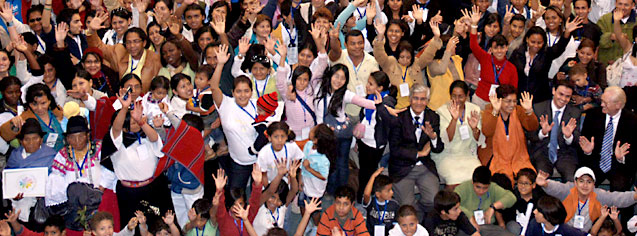 The Quito participants give a rousing wave for the camera. More photographs
The Quito participants give a rousing wave for the camera. More photographsThe Quito Regional Conference
22–23 November 2008
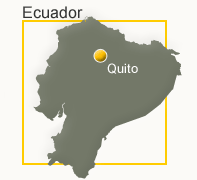
A woman’s voice intoning a supplication in the Quechua language was the opening prayer for the regional conference in Quito, Ecuador, which drew 1,150 believers from Ecuador, Peru, Colombia and Venezuela. Minutes earlier, the friends had crowded into the conference hall, with fond embraces and joyful faces imbuing the atmosphere with the characteristic warmth of the Latin American community.
The drawing power of the conference was evident. Stories of how people made it to Quito – overcoming barriers through sacrifice and sheer determination – were quietly circulating as travelers began arriving.
There was the 17-year-old woman who, upon learning that she wouldn’t be able to attend without a government ID document, persevered until she reached the governor of her region. He was so impressed by her diligence and desire to take part in the conference that he personally granted her the document.
There was a youth, the only Baha’i in his family, who so longed to attend that for several weeks he chanted a special prayer each day, supplicating Baha’u’llah for His help in seizing what the youth considered a rare opportunity. The young man made it to Quito – and also learned the prayer by heart.
“The spiritual atmosphere mixed with planning is creating an experience of a Baha’i conference like no one has ever seen.”
Among the most moving stories was that of the friends from the Guajira peninsula, the northern tip of South America that straddles Colombia and Venezuela. It is an arid, desertlike area, and most of the people are of the Wayuu indigenous group. As soon as they heard the call of the Universal House of Justice to attend the conference, they organized themselves into committees to make arrangements. A key committee was the one in charge of documents. Getting the required ID cards, passports, visas and yellow fever vaccinations in just a few short weeks was daunting – and in some cases, heartbreakingly impossible.
One youth from the Colombian side of the Guajira raised money by working as many odd jobs as he could find. He walked all the way to the nearest city to get his vaccination only to be told to return another day – which he did. But in the end he couldn’t travel to Ecuador because he was under-age and had to get written consent from his father, who lives in Venezuela and couldn’t be reached in time. The young man joyfully contributed his hard-earned cash – the equivalent of about US$8 – to help others make the trip.
Fourteen friends from the Guajira left their regional capital of Riohacha at 4 p.m. the Tuesday before the conference, but 13 hours later the bus they were on collided head-on with a truck, destroying the bus and killing the bus driver’s assistant. One of the Baha’is suffered a broken leg and couldn’t continue the long journey. All the passengers were taken to the closest hospital, and 13 of the Baha’is were able to continue their trip after getting patched up. The little money they had was spent in dealing with the accident, but no matter … they said they were determined to make it to the conference to which they had been invited by the Universal House of Justice.
Gathering and consulting
As the conference opened, a deeply inspiring message from the Universal House of Justice to the gathering was read by Counselor Leticia de Solano. Mr. Stephen Birkland – who along with Mr. Juan Francisco Mora represented the Universal House of Justice – then addressed the group, as did some of the South American counselors.
The morning workshops were devoted to study of the 20 October letter and the new message from the House of Justice. The afternoon session focused on the different elements of the pattern of growth in a cluster. Discussions were enriched by the experiences recounted by friends from all the countries participating in the conference.
“Truly, the conference has been spectacular. I have lived for 60 years in the Baha’i community in Peru, and I have never been to such a marvelous event. ”
Martha Tirado de Lopez - La Victoria, Lima, Peru
Martin Vega from Norte de Cordoba, Colombia, shared how, after having studied Book 1 of the Ruhi Institute sequence for only five days, he arose to serve as a tutor of a study circle himself. “Someone helped him, and now he gives back the ‘accompaniment,’ the love and the nurturing that were given to him,” commented a counselor.
Teresa de Jesus, from Piura, Peru, described how in a short period of time her cluster went from having only five tutors, two children’s classes, and one junior youth group, to being ready to launch an intensive program of growth. “We should not underestimate the power of a handful of tutors,” she concluded.
On Sunday, the conference focused on two key questions:
- “What can I do to help my cluster reach sustainable growth?”
- “What can I do to help other clusters to launch an intensive growth program?”
The participants divided themselves into workshop groups by region, and detailed plans were worked out on how to meet the challenge of achieving 20 clusters with intensive programs of growth by next Ridván.
All through the conference, many long-standing Baha’is commented that the gathering seemed unprecedented. As one counselor put it: “The spiritual atmosphere mixed with planning is creating an experience of a Baha’i conference like no one has ever seen.”
“I expect it is setting a standard for the future,” he added.
(Compiled from reports from counselors and other participants)
Comments from participants
 Geraldine Vanessa Harb Peralta, age 24, Barlovento, Venezuela: “You ask how the conference
has helped me see my role in addressing the needs of society. It definitely has
helped in the sense of putting right at hand the tools that I need. It has clarified
things that perhaps I knew, but now they are more ‘on the table,’ easier for me to
reach.”
Geraldine Vanessa Harb Peralta, age 24, Barlovento, Venezuela: “You ask how the conference
has helped me see my role in addressing the needs of society. It definitely has
helped in the sense of putting right at hand the tools that I need. It has clarified
things that perhaps I knew, but now they are more ‘on the table,’ easier for me to
reach.”
 Carlos Chirinos, age 37, Caracas, Venezuela: “I think the conference has been very
good. The organization was done very well. The workshops have been excellent…. I
see that they have helped people understand that we have to work faster to achieve
the goals.”
Carlos Chirinos, age 37, Caracas, Venezuela: “I think the conference has been very
good. The organization was done very well. The workshops have been excellent…. I
see that they have helped people understand that we have to work faster to achieve
the goals.”
 Manuel Rosas, age 43, Lima, Peru: “This is the first conference I have ever been to.
I have been a Baha’i four or five years, and this has been marvelous – positive in
every way. Many things that we had been learning are being clarified. We are getting
a much clearer picture of what it is that we are doing.”
Manuel Rosas, age 43, Lima, Peru: “This is the first conference I have ever been to.
I have been a Baha’i four or five years, and this has been marvelous – positive in
every way. Many things that we had been learning are being clarified. We are getting
a much clearer picture of what it is that we are doing.”
 Gabriela Medina, age 21, Lima, Peru: “How was the conference? Great! Super good. I
am going home motivated to begin my core activities and continue with the Plan. The
logistics were very well organized, and I loved the workshops because I never expected
that there would be representatives of the Universal House of Justice. Everyone at
the workshops was very united.”
Gabriela Medina, age 21, Lima, Peru: “How was the conference? Great! Super good. I
am going home motivated to begin my core activities and continue with the Plan. The
logistics were very well organized, and I loved the workshops because I never expected
that there would be representatives of the Universal House of Justice. Everyone at
the workshops was very united.”
 Jaime Til, 30, Otavalo, Ecuador: “When I get home, my personal plan is to start
with one of the core activities to work toward the goal in our cluster, which is
to launch an intensive program of growth. All the friends are going to help out in
one way or another. My own plan is to start a study circle.”
Jaime Til, 30, Otavalo, Ecuador: “When I get home, my personal plan is to start
with one of the core activities to work toward the goal in our cluster, which is
to launch an intensive program of growth. All the friends are going to help out in
one way or another. My own plan is to start a study circle.”
 Carol Til, age 35, Winay, Tungurahua, Ecuador: “The conference was an unforgettable
experience. We have never had this kind of experience, to see so many people from
so many countries.”
Carol Til, age 35, Winay, Tungurahua, Ecuador: “The conference was an unforgettable
experience. We have never had this kind of experience, to see so many people from
so many countries.”
 Belkis Paz, age 36, Rio Algo, Guajira, Colombia: “After a conference like this, one
is motivated to do more, to sacrifice more, because we are reading the guidance from
the World Center. This inspires us. Sometimes you get tired and feel like you have
to rest, but with something like this, you get inspired again to sacrifice more,
to make an effort to complete the Plan.”
Belkis Paz, age 36, Rio Algo, Guajira, Colombia: “After a conference like this, one
is motivated to do more, to sacrifice more, because we are reading the guidance from
the World Center. This inspires us. Sometimes you get tired and feel like you have
to rest, but with something like this, you get inspired again to sacrifice more,
to make an effort to complete the Plan.”
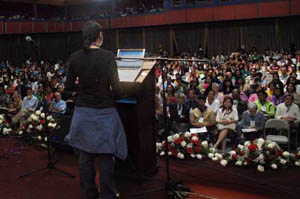
A Baha’i from Venezuela reports back to the conference after workshop consultations.
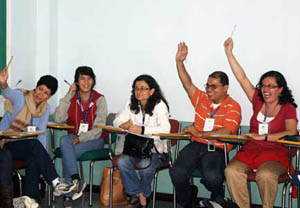
Workshops focus on activities in specific clusters.
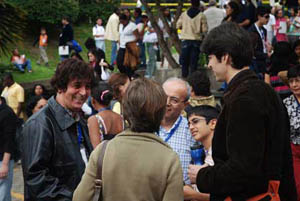
The conference provides opportunities to chat with friends, new and old.
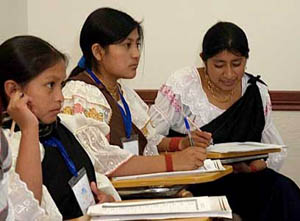
Three young ladies attend a workshop for their region.
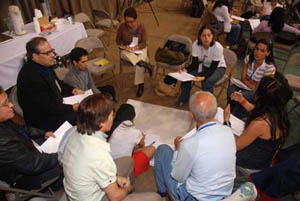
This is one of the workshops focusing on Venezuela, one of four countries included in the Quito conference.
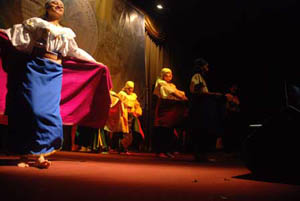
Dance performances and music are part of almost all the conferences.
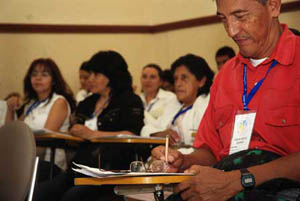
Gabriel Alberto Quintero of Colombia participates in a workshop.
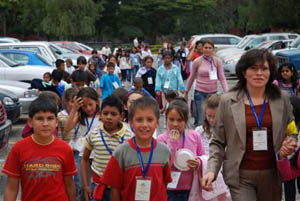
Children had some of their own activities at the gathering.
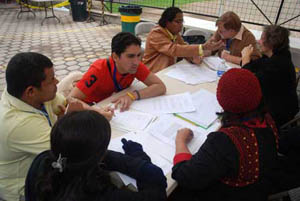
Very specific planning for activities in the clusters is part of the workshops.
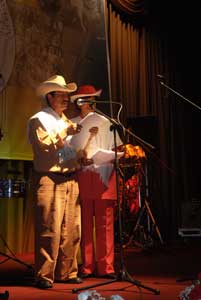
Arcenio and Telma Arbelaez offer a folk performance of poetry.
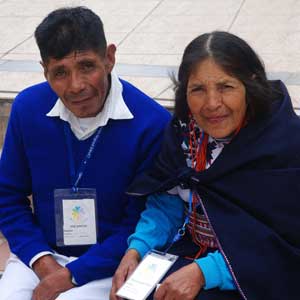
Jose Santos and Maria Josefa Pacari of Ecuador were among those attending the gathering.
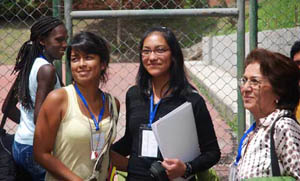
The Quito conference was the first of three to be held in South America. The others will be in Antofagasta, Chile, and Sao Paulo, Brazil.
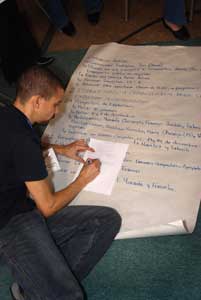
Planning for intensive programs of growth in goal clusters is a key part of the conferences.
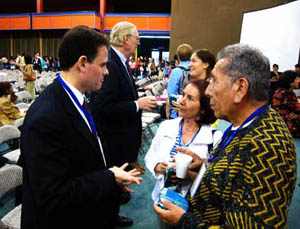
Representatives of the Universal House of Justice talk with conference participants.
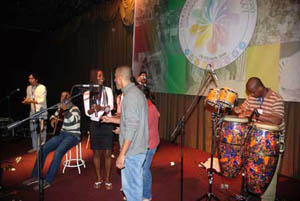
A Colombian band adds spirit to the gathering.














